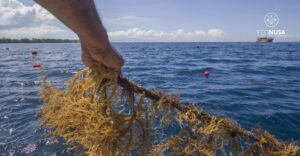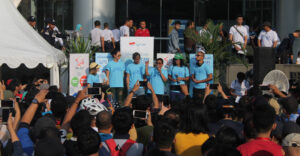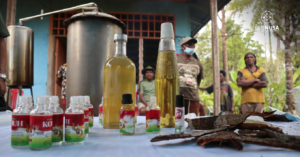
EcoNusa Foundation plans to support Government of Kaimana Regency through collaborative works in an effort to achieve sustainable utilization of forest and maritime ecosystem for people’s welfare. In this light, EcoNusa delivers EcoNusa Portfolio comprising of five pillars. They are the development of local community-based ecotourism program, strengthening local community-based commodity management initiative, support for low carbon development in Kaimana Regency, youth participation in ecotourism and commodity management, and program implementation of knowledge and experience sharing from and to other places. In addition to regency level, EcoNusa will also work at Kaimana and Borowai Districts and four villages, namely Tanggaromi, Murano, Namatota and Edoor. As the pioneer, EcoNusa will work initially at Tanggaromi Village.
These issues turned up in a discussion involving the Government of Kaimana Regency in a workshop entitling “Partnership Approach in Sustainable Development Implementation” in Kaimana, West Papua on March 16, 2020. The workshop was attended by 38 participants including Tahmid Husein, Assistant II on Economics and Development, Head of Regency’s National and Political Unity Office (Kesbangpol), Head of Transportation Office, Head of Village Community Empowerment Office, Head of Culture and Tourism Office, Secretary of Agriculture and Food Security Office, Regional Development Planning Agency (Bappeda), Kaimana’s Natural Resources Conservation Agency (BKSDA), and some representative from Fisheries and Maritime Office, Environmental Office, Industry and Trade Office, Forestry IV Office, regional apparatus organization (OPD) and development partners. In the event, EcoNusa also handed in some Mamatoa goodie bag containing Kaimana Portfolio draft, FOLU report, and Report on Land of Papua Ecotourism Workshop.
On discussion session, EcoNusa got many inputs to finalize the portfolio draft. Kaimana’s Head of Culture and Tourism Office, Usman Fenetiruma, called EcoNusa to examine the regency’s tourism plan documents. “To materialize the goal, we have to make synergy with relevant OPDs, and now with EcoNusa to promote and develop tourism potential in Kaimana Regency,” said Usman.
Head of Village Community Empowerment Office, Joice M. Tuanakotta, expected that EcoNusa could build the capacity of village apparatus and human resources at village level so that they are aware of their own natural resource’s potentials. “EcoNusa must not build a warehouse but also give an added value of the commodity so as to make various products,” said Joice informing EcoNusa that Namatota Village was encouraged to be a tourism village. There are 84 villages in Kaimana that get IDR 99 billion Village Funds.
The community in Kaimana Regency has nutmeg and banana as the commodity. Market for nutmeg has no problem and banana is sold to Timika. With the assistance of EcoNusa, it is expected to help seek and connect the products and broader markets so that the community could have more new products with lucrative selling points.
In addition to agriculture, the local government also informs that the community also cultivate seaweed, mangrove crabs at Bicari Bay regions. In this case, EcoNusa might provide help to develop the maritime natural resources here.
After the workshop, EcoNusa team paid a visit to Tanggaromi Village located 30-kilometer away with 30-minute ride on land transport. The team met a group of women who established cooperatives to sell banana. Considering the potentials, EcoNusa plans to provide training on food processing after crop so as to give added values from local types of banana, such as raja, kapok, and dewaka. In addition to banana, Tanggaromi also has other potentials such as coconut, shrimp, crab and red snapper.
Authors: Aloysius Numberi dan Muhammad Farid
Editor: Leo Wahyudi




